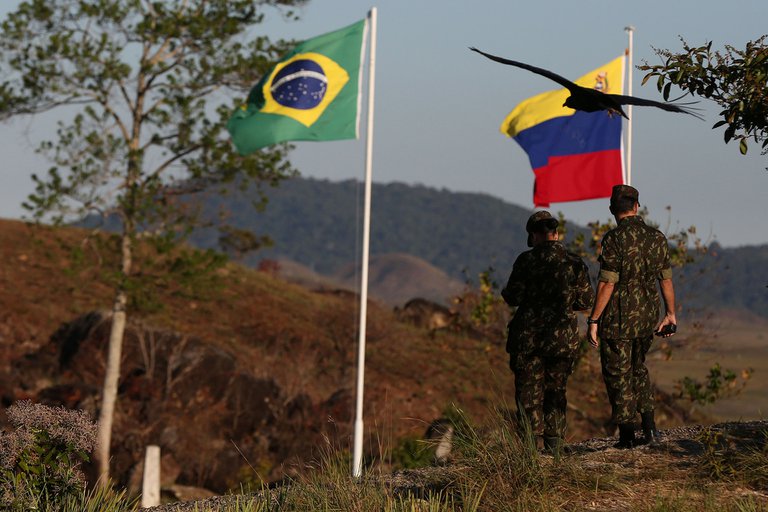RIO DE JANEIRO, BRAZIL – In recent weeks, images of Iranian-made military drones in Venezuela have emerged, as well as statements by the Caracas regime regarding its interest in acquiring ground-to-ground missiles with unspecified ranges, also of Persian origin. Iran’s arsenal comprises a wide variety of missiles with ranges from 100 to 2,000 kilometers.
Undoubtedly, if the arrival of the longest-ranging missiles were to materialize, we would witness a 2.0 version of the 1962 Cuban crisis and the Soviet missile launchers.
It is unlikely that Tehran will receive Joe Biden, assuming he takes office on January 20th. The economic damage that the U.S. sanctions imposed by Donald Trump have caused to the Persian country is substantial and mounting. In parallel, there have been successful attacks by the U.S. and Israel throughout this year on key figures in the armed wing and the regime’s nuclear efforts.

Likewise, the steady arrival of sophisticated weaponry of Russian origin to Venezuelan soil has heightened the resentment of Brazil’s military, diplomatic, and political leaderships.
Undoubtedly, the potential for conflict on the northern border dividing the two South American countries has emerged and is bound to grow. Historically, until the end of the 1970s the hot spot of Brazilian defense was Argentina. Once it was overcome and the measures of mutual trust in the nuclear sector and economic integration were consolidated, the Brazilian Armed Forces (FFAA) focused their interest on the potential interference of extra-regional powers in the Amazon area, attracted by its natural wealth and biodiversity.
However, slowly but steadily, and particularly after the exit of the Workers’ Party (PT) from power amid corruption scandals and political and economic crisis, Brasilia’s strategic military planning considers the Venezuelan situation to be a ticking time bomb.
On the one hand, Biden’s aggressive comments during his electoral campaign against Brazil and the protection of the Amazon – designed to keep his party’s left-wing happy – strain the bilateral relationship with Bolsonaro’s government. On the other hand, the massive Cuban presence and, to a lesser extent, the Iranian and Russian presence in Venezuela, will tend to produce strong common interests with Brazil during the next U.S. administration.
Over the past 100 years, Washington has actively and decisively intervened every time a foreign power has attempted or succeeded in gaining a foothold in the hemisphere. This time, there is no indication that it will be any different.
Between allying with his Green party supporters and national security, Biden and his team will not hesitate to choose the latter. Even more so, given the Russia-phobia of this political group since the defeat of Hillary Clinton by Trump in 2016.
In this intense and sensitive regional scenario, Argentine policy-makers will have to be extremely cautious and fully informed.
The Kirchnerist rhetoric of selling Biden as a social democrat, who comes to help everyone in the region, may be echoed to please powerful minorities, but should not be taken at face value. This rapprochement between Washington and Brasilia, which stems from the threat that is nesting in Venezuela, provides an opportunity for Argentina’s presidential and ministerial diplomacy to foster a fluid dialogue with both Bolsonaro and the White House.
The notion that a democratic government will consider Argentina as a key and articulating state has no material basis in reality. However, this does not imply that it is insignificant enough to be excluded from any play or initiative: it is neither one extreme nor the other.
Likewise, Argentina must understand that the convenient and attractive formula of perceiving Moscow and Beijing as a coordinated and united axis with regard to the United States is far from being so. Day by day new areas of friction between the powers are emerging, starting with the massive and accelerated sale of sophisticated Russian armaments to India during the recent border crisis between New Delhi and Beijing that left dozens of dead. Another example is Moscow’s harsh reaction to comments by Chinese officials about Beijing’s sovereign rights over Russian areas such as Vladivostok.
Nor must we forget Putin’s interest in preventing Iran and its oil wealth and strategic projection in the Gulf and the Middle East from being controlled by the economic and political power of China.
In other words, the best Argentina can do is have a clear and pragmatic international policy agenda that finds opportunities for dialogue and cooperation with our key partner – Brazil – and countries like Chile, as well as with the United States, China, Russia, the European Union (EU) and the booming Asian powers that do not want to fall under Chinese influence.
In these efforts, it must avoid crossing red lines that are sensitive to the main regional power – Brazil – and to those in the new government in Washington DC.
In the colorful Argentine governing coalition, which includes politicians who admire Trump’s personal attorney leading the accusations of fraud, as well as political leaders who, since 2011, feel they are natural successors of Fidel and Chavez, it is crucial to consider that the symbolic capital for its intense petty-bourgeois and urban minorities and with an aesthetics closer to the Communist Party and the Frepaso than to Peronism, should not pass now nor in the next critical years through sensitive foreign policy issues.
A country with the economic and social weaknesses of Argentina and with a presidentialist political system formally, yet deliberative in reality, has no room for this. The games for the stands, therefore, will have to be played from other angles. Hopefully, not again through the Dantesque scenes of Diego Maradona’s wake.
Source: infobae

